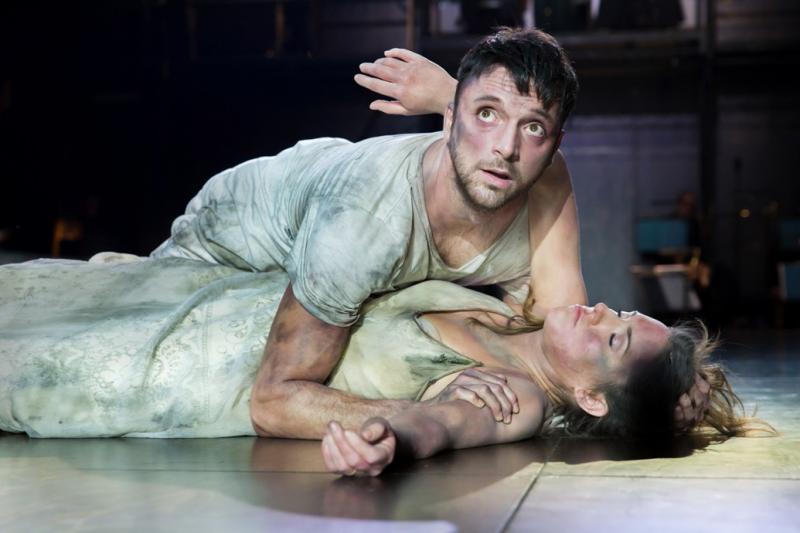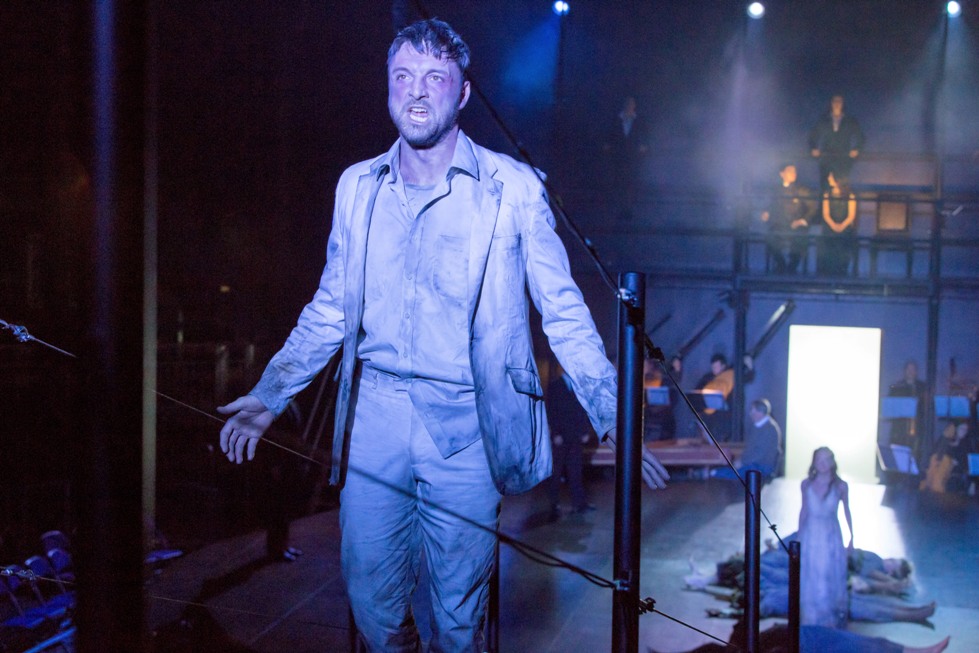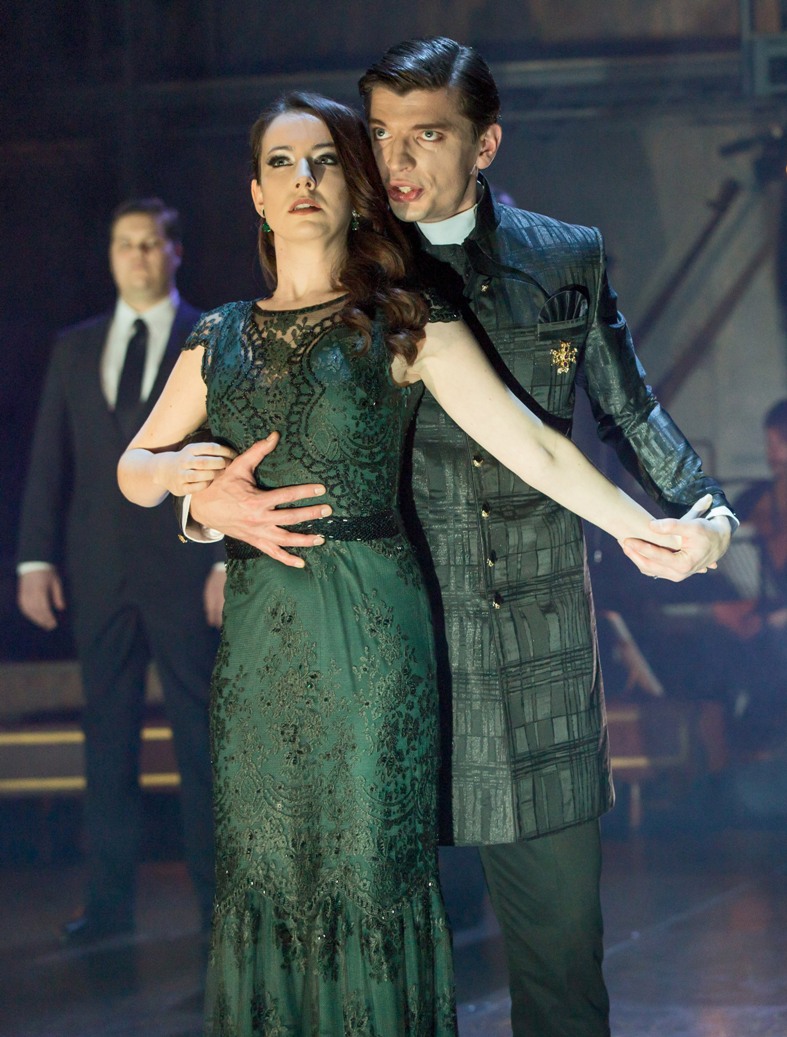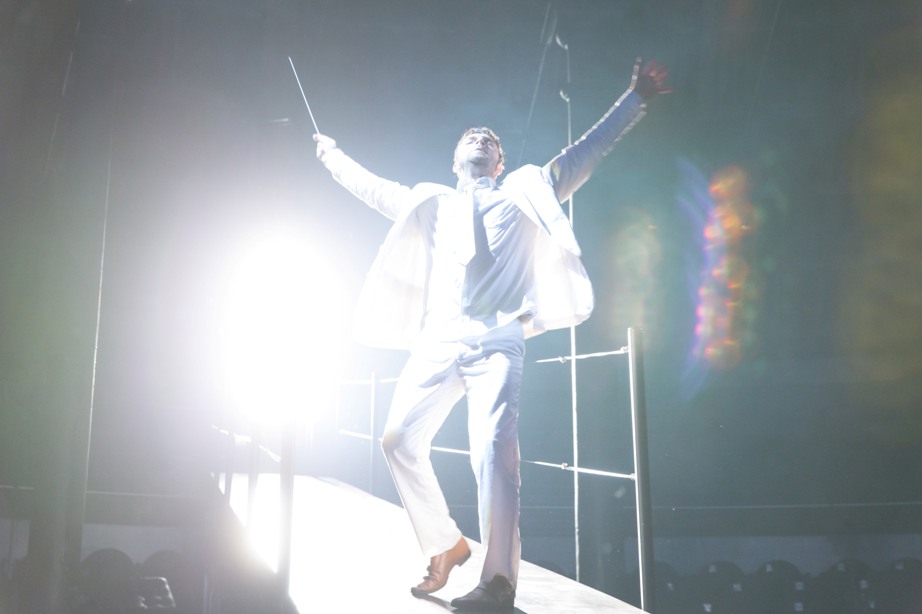Orfeo, Royal Opera, Roundhouse | reviews, news & interviews
Orfeo, Royal Opera, Roundhouse
Orfeo, Royal Opera, Roundhouse
Austerely beautiful retelling of mythic Orpheus's grief and trials, with sounds to match

It’s quite a distance from the first performance of Monteverdi’s operatic cornucopia under the Mantuan Gonzagas’ imperious eye to this democratic celebration at the Roundhouse – 408 years, to be precise. Michael Boyd’s production takes us back even further, to those ancient Greek festivals of poetry and music which inspired the intellectual Florentines to fashion the art of opera in the late 16th century.
One third of the Roundhouse seating is blocked by a grand edifice with a contemporary court seated half way up, the orchestra at its base, leaving us in a near-perfect amphitheatre with the performers on a semicircular stage and a ramp that leads upwards to liberation, or downwards to hell. Take off the roof, and we could be in a smaller-scale 21st century version of Athens’ Theatre of Dionysus.
 It all not only looks austerely beautiful in the spare designs of Tom Piper – he of the Tower’s simple poppy-river of blood – with powerful lighting by Jean Kalman, but it sounds amazing too. I’m not sure I would have known, had the press officer not been sure to tell some of us before we went in, that discreet amplification had been used, for whatever Sound Intermedia had done merely enhanced the gorgeousness of Monteverdi’s 21-piece orchestra and left the voices to engage at close quarters. Our proximity made one wonder afresh at the glory of the operatic voice: it was a highlight to have Gyula Orendt’s Orfeo or Susan Bickley’s Silvia acting so intensely with their voices on the ramp only feet away.
It all not only looks austerely beautiful in the spare designs of Tom Piper – he of the Tower’s simple poppy-river of blood – with powerful lighting by Jean Kalman, but it sounds amazing too. I’m not sure I would have known, had the press officer not been sure to tell some of us before we went in, that discreet amplification had been used, for whatever Sound Intermedia had done merely enhanced the gorgeousness of Monteverdi’s 21-piece orchestra and left the voices to engage at close quarters. Our proximity made one wonder afresh at the glory of the operatic voice: it was a highlight to have Gyula Orendt’s Orfeo or Susan Bickley’s Silvia acting so intensely with their voices on the ramp only feet away.
Boyd, who has already worked the Roundhouse space less successfully in the RSC Antony and Cleopatra, made me wonder what he was up to at first here, too. His context is to have the myth of the great musician who loses his new bride and goes down to Hades to reclaim her, only to lose her again by looking back as he leads her towards the light (pictured above), told by a group of prisoners in an authoritarian court, a contemporary Mantua. With East London dancers and acrobats of diverse ages enlivening the scene, we should be smiling at the wedding of Orpheus and Euridice. But we feel constrained by the enforced storytelling; there's no real joy, so her death doesn’t quite come as the extreme contrast it should.
 Once we’re in hell, though, it all begins to fit. The terribly handsome, strikingly coutured ducal couple who’ve been watching the action as we watch them, spellbound, become Pluto and Proserpina – equivalent to Midsummer Night’s Dream equation of Theseus and Hippolyta with Oberon and Titania. They sound as gorgeous as they look (pictured left), the utterly compelling Rachel Kelly especially, though Callum Thorpe’s is a voice of promise, too, a bass to match the authoritative Charon/Security Guard of James Platt (like Kelly, a singer on the Royal Opera’s Jette Parker Young Artists Scheme). Principals melt into the chorus of students from the Guildhall School of Music and Drama, especially superb and immediate in the lament that follows Euridice’s death. There are expressive cameos from Bickley, tenor Alexander Sprague and countertenor Christopher Lowrey, but their contributions are rightly only part of a musically near-perfect whole.
Once we’re in hell, though, it all begins to fit. The terribly handsome, strikingly coutured ducal couple who’ve been watching the action as we watch them, spellbound, become Pluto and Proserpina – equivalent to Midsummer Night’s Dream equation of Theseus and Hippolyta with Oberon and Titania. They sound as gorgeous as they look (pictured left), the utterly compelling Rachel Kelly especially, though Callum Thorpe’s is a voice of promise, too, a bass to match the authoritative Charon/Security Guard of James Platt (like Kelly, a singer on the Royal Opera’s Jette Parker Young Artists Scheme). Principals melt into the chorus of students from the Guildhall School of Music and Drama, especially superb and immediate in the lament that follows Euridice’s death. There are expressive cameos from Bickley, tenor Alexander Sprague and countertenor Christopher Lowrey, but their contributions are rightly only part of a musically near-perfect whole.
How we miss Christian Curnyn, founder-conductor of the superb Early Opera Company; I wish him a full return to health with all my heart. But Christopher Moulds, from the harpsichord and sometimes the organ, certainly directs the EOC ensemble with verve and soul. In this space, whatever the role of the “enhancement”, every timbre can tell, from a sole note on the lirone/cello as grief strikes to the solemn harmonies of the brass Monteverdi was able to call into play at the Mantuan court.
 It was an inspired decision, I think, to have Alessandro Striggio’s text sung in a never too self-consciously poetic translation by Don Paterson. True, the speech-melodies of the original Italian are lost, but a new, near-perfect fit takes their place – and as the Roundhouse audience was a genuine mix, with plenty of young people in the cheaper seats with no restricted sightlines, that helped. At first I questioned the English text's delivery by Transylvanian baritone Orendt (as musician, above), and I’ll always prefer a honeyed British ex-choral-scholar tenor of the kind we now have in droves singing the great test of Orfeo’s power to move by music, best known in Italian as “Possente spirto” with its wonderful interjections from cornets and harp (Siobhán Armstrong, consummate). But Orendt richly atones with true vocal and dramatic intensity, his Euridice, Mary Bevan, not too far behind him.
It was an inspired decision, I think, to have Alessandro Striggio’s text sung in a never too self-consciously poetic translation by Don Paterson. True, the speech-melodies of the original Italian are lost, but a new, near-perfect fit takes their place – and as the Roundhouse audience was a genuine mix, with plenty of young people in the cheaper seats with no restricted sightlines, that helped. At first I questioned the English text's delivery by Transylvanian baritone Orendt (as musician, above), and I’ll always prefer a honeyed British ex-choral-scholar tenor of the kind we now have in droves singing the great test of Orfeo’s power to move by music, best known in Italian as “Possente spirto” with its wonderful interjections from cornets and harp (Siobhán Armstrong, consummate). But Orendt richly atones with true vocal and dramatic intensity, his Euridice, Mary Bevan, not too far behind him.
Orendt’s great moment comes not in the centrepiece but in his final plea when he’s lost his other half again and is a plaything of the gods (for which, in this production, read the Catholic Church). Infinitely simple and confidential, playing on the discreet but extraordinary dissonances with the now scaled-down group of instruments, this was the true core of the evening, and Boyd caps it by bringing back the suspended halters in which Euridice has already been laid and carrying his Orfeo aloft, Orendt managing to act for his life as he stretches downwards to his reviving love. An unforgettable tableau in a visual context which will linger in the mind’s eye, as the sounds will in the ear, for a very long time.
- Orfeo at the Roundhouse until 24 January. Livestreaming and a March broadcast on BBC Radio 3 are planned.
rating
Explore topics
Share this article
The future of Arts Journalism
You can stop theartsdesk.com closing!
We urgently need financing to survive. Our fundraising drive has thus far raised £49,000 but we need to reach £100,000 or we will be forced to close. Please contribute here: https://gofund.me/c3f6033d
And if you can forward this information to anyone who might assist, we’d be grateful.

Subscribe to theartsdesk.com
Thank you for continuing to read our work on theartsdesk.com. For unlimited access to every article in its entirety, including our archive of more than 15,000 pieces, we're asking for £5 per month or £40 per year. We feel it's a very good deal, and hope you do too.
To take a subscription now simply click here.
And if you're looking for that extra gift for a friend or family member, why not treat them to a theartsdesk.com gift subscription?
more Opera
 La bohème, Opera North review - still young at 32
Love and separation, ecstasy and heartbreak, in masterfully updated Puccini
La bohème, Opera North review - still young at 32
Love and separation, ecstasy and heartbreak, in masterfully updated Puccini
 Albert Herring, English National Opera review - a great comedy with depths fully realised
Britten’s delight was never made for the Coliseum, but it works on its first outing there
Albert Herring, English National Opera review - a great comedy with depths fully realised
Britten’s delight was never made for the Coliseum, but it works on its first outing there
 Carmen, English National Opera review - not quite dangerous
Hopes for Niamh O’Sullivan only partly fulfilled, though much good singing throughout
Carmen, English National Opera review - not quite dangerous
Hopes for Niamh O’Sullivan only partly fulfilled, though much good singing throughout
 Giustino, Linbury Theatre review - a stylish account of a slight opera
Gods, mortals and monsters do battle in Handel's charming drama
Giustino, Linbury Theatre review - a stylish account of a slight opera
Gods, mortals and monsters do battle in Handel's charming drama
 Susanna, Opera North review - hybrid staging of a Handel oratorio
Dance and signing complement outstanding singing in a story of virtue rewarded
Susanna, Opera North review - hybrid staging of a Handel oratorio
Dance and signing complement outstanding singing in a story of virtue rewarded
 Ariodante, Opéra Garnier, Paris review - a blast of Baroque beauty
A near-perfect night at the opera
Ariodante, Opéra Garnier, Paris review - a blast of Baroque beauty
A near-perfect night at the opera
 Cinderella/La Cenerentola, English National Opera review - the truth behind the tinsel
Appealing performances cut through hyperactive stagecraft
Cinderella/La Cenerentola, English National Opera review - the truth behind the tinsel
Appealing performances cut through hyperactive stagecraft
 Tosca, Royal Opera review - Ailyn Pérez steps in as the most vivid of divas
Jakub Hrůša’s multicoloured Puccini last night found a soprano to match
Tosca, Royal Opera review - Ailyn Pérez steps in as the most vivid of divas
Jakub Hrůša’s multicoloured Puccini last night found a soprano to match
 Tosca, Welsh National Opera review - a great company reduced to brilliance
The old warhorse made special by the basics
Tosca, Welsh National Opera review - a great company reduced to brilliance
The old warhorse made special by the basics
 BBC Proms: The Marriage of Figaro, Glyndebourne Festival review - merriment and menace
Strong Proms transfer for a robust and affecting show
BBC Proms: The Marriage of Figaro, Glyndebourne Festival review - merriment and menace
Strong Proms transfer for a robust and affecting show
 BBC Proms: Suor Angelica, LSO, Pappano review - earthly passion, heavenly grief
A Sister to remember blesses Puccini's convent tragedy
BBC Proms: Suor Angelica, LSO, Pappano review - earthly passion, heavenly grief
A Sister to remember blesses Puccini's convent tragedy
 Orpheus and Eurydice, Opera Queensland/SCO, Edinburgh International Festival 2025 review - dazzling, but distracting
Eye-popping acrobatics don’t always assist in Gluck’s quest for operatic truth
Orpheus and Eurydice, Opera Queensland/SCO, Edinburgh International Festival 2025 review - dazzling, but distracting
Eye-popping acrobatics don’t always assist in Gluck’s quest for operatic truth

Add comment